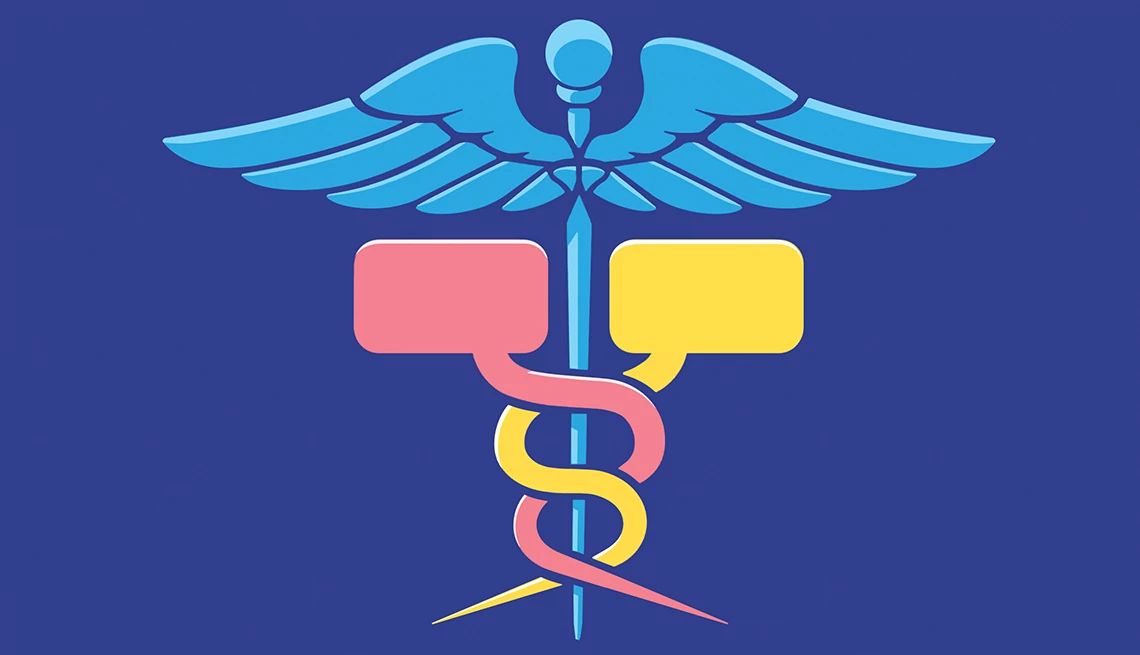AARP Hearing Center


Key takeaways
- Relatives mean well but lack expertise in medical matters.
- Receiving information in the language you need is your right.
- How to find a medical interpreter and get Medicare help.
- Give a health care provider ample notice of your needs.
- Write out questions in advance; take notes at appointments.
Working in the medical field as a language interpreter, Marisol Fitzwater has witnessed her fair share of patients at doctor’s appointments and hospital visits who speak little to no English — and she’s seen their family members, often with little to no knowledge of medicine, translate and interpret complicated health care matters.
Fitzwater has also heard anecdotes about the perils of untrained interpreters unintentionally giving a health care provider faulty information: identifying pain on the wrong side of the patient’s body, for example, or relaying the wrong dosage of medication.
But these miscommunications don’t have to happen. Patients of any age who aren’t fluent in English have the right to a certified medical interpreter — for free.
Translations from friends, relatives may be wrong
While loved ones may be able to communicate basic concepts, they often lack knowledge about medical terminology and practices designed to help a patient, says Fitzwater, the interpreter quality assurance department manager at Certified Languages International in Portland, Oregon.
“Medicine, in general, is difficult,” says Carola Cerezo-Allen, a nurse in Washington, D.C., who has worked with patients in a variety of languages. “And when someone is trying to communicate to the other that they’re sick, there are a lot of emotional components, educational components” that must be discussed between a patient and a medical provider.
While some offices and hospitals have interpreters on staff, technology such as video calling has made it possible for patients to connect remotely with a certified medical interpreter in the patient’s language of choice, even if that language is rare, Cerezo-Allen says. Some medical providers use companies such as Certified Languages International, where Fitzwater works, to help.
“It reduces confusion,” Fitzwater says.
Free medical interpretation services are your legal right
Federal law barring discrimination based on race, color, religion, sex or national origin also bans discriminating against people because of their native language.
An executive order signed by then-President Bill Clinton in 2000 clarified some of the protections guaranteed in the Civil Rights Act of 1964: Any organization receiving federal money — not only in health care but in other areas such as public safety and in court — must provide access to language assistance for individuals with limited English proficiency.
2010’s Affordable Care Act and the regulations adopted because of it further strengthened this medical right.
In the United States, about 1 in 12 people age 5 or older can’t speak or understand English well, according to the U.S. Census Bureau’s 2023 American Community Survey. Among adults 65 and older, that figure rises to about 1 in 6.
That means more than 27 million people age 5 or older, a little less than 40 percent of those who speak a language other than English at home, speak English less than well, the Census Bureau says. Of those, almost 10 million are adults 65 or older, according to Justice in Aging, a national legal advocacy nonprofit based in Washington, D.C.
Spanish, Mandarin and Vietnamese are the top languages spoken among older adults who are more comfortable in their native language, Fitzwater says. But in certain parts of the country, Tagalog, popular in the Philippines, or Arabic are among the most widely used. These five languages are among the most popular of the more than 350 spoken in the United States.
Though the need is great, having a patient’s friend or family member, especially a minor, interpret for them is against the spirit of a law designed to protect the patient’s rights, Cerezo-Allen says. An imprecise translation can affect the diagnosis of an illness or its treatment. Using a professional can avoid that result.




































































Next in series
How Can I Appeal a Denied Medicare Claim?
This guide can help you start what could be a lengthy process